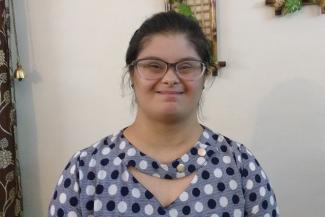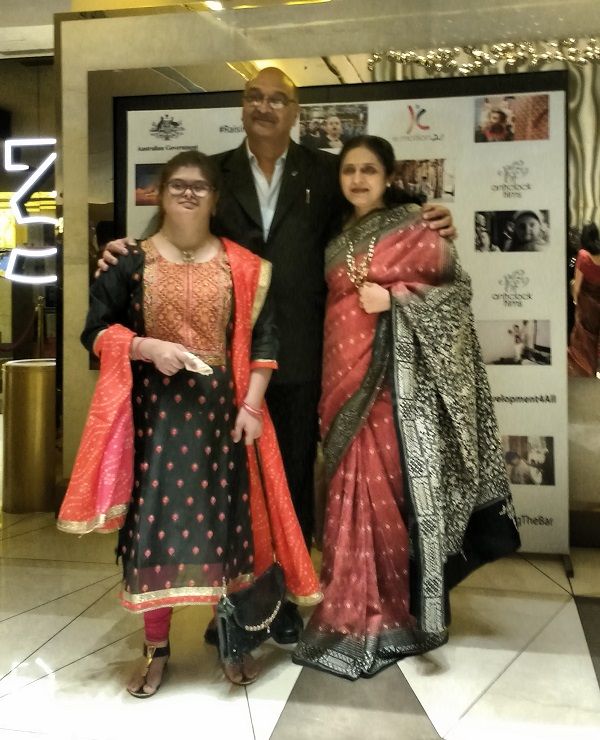
Devanshi was born with Down’s Syndrome, but that did not stop her from trying out every opportunity that came her way, says Devanshi’s father, Anil Joshi
Please tell us how and when Devanshi was diagnosed with Down’s Syndrome?
Diagnosis was done immediately after birth by looking at physical features. It was later confirmed by blood test Karyotyping where the presence of 47 chromosomes gets confirmed.
Down’s Syndrome is a condition and NOT a Disease. Persons with Down’s Syndrome ARE NOT PATIENTS, but Individuals with Down’s Syndrome. We never say, They Suffer from a disease.
How did you go about handling it, since early intervention is very important for all children and 0-6 years is the golden phase?
It was a great shock and overwhelming to know, since Down’s Syndrome was a new terminology for us. One is expecting everything to be alright, whereas there were so many new words I was hearing for the first time. I decided to know about the details first myself before sharing it with my wife. I had lots of inputs from my Doctor friends, who also said that they did not know much, beyond the preliminary information.
I therefore immediately reached out to my friends from various locations in India and abroad. I spent a lot of time gathering proper information from friends and other parents and then shared the information with my wife after nearly 4 months. This helped in establishing a bond and it did not take much time for her to accept the situation quickly. I had information about most of the questions by then. Without wasting much time, we met a Developmental Pediatrician and started Early Intervention therapies. We also availed of services regularly from OT Deptt of Govt Medical College. Meeting parents of children in the same age range and understanding their efforts and emotions also helps early acceptance of the condition of the child by the family and parents. This is very important.

Do you think early intervention is particularly relevant for intellectually challenged children? Your advice to parents with children who are recently diagnosed.
Once the child's condition is understood properly and accepted, it becomes easier for parents. Early Intervention helps, since it involves ALL activities of Brain Stimulation. It can thus be incorporated in EVERYTHING we do with the child - even at home. Thus, if specialists are not available in some locations, parents can learn and understand the principles from expert professionals and then they can do these therapies at home. Meantime, if there are any medical conditions, we need to address them in time (other than vaccinations and check ups). The less time we lose on grieving, the more we are focussed on the child's development. The child is happy and growing anyway at his/ her own pace. We need to read a lot and also ask people for information/ tips.
Please tell us about your journey with Devanshi.
We were a joint family at the time of the birth of Devanshi, So everyone was involved in many ways in understanding about this condition called Down’s Syndrome, Intellectual & Developmental Disability, Delayed Milestomes and so on... But it helped in coping up with the situation and also giving emotional support to each other. We quickly connected with many families and a few special schools to understand various details. We quickly came to the conclusion that we will deal with Devanshi like any other child, rather than her disability/ condition. She was involved in all the day to day activities, giving her constant exposure to as many things as possible. Early Intervention was also going on. All these things helped in a big way in developing her Hypotonia and flexible joints. Traditional message and exercises also helped a lot. So, Devanshi grew up almost at par with her age peers. She was then put in Play Group, Pre-Primary and then Primary, with typical peers. We had to toilet train her and also explain to others that she has speech issues.
So, we decided to put Devanshi in regular school rather than Special School. The condition of special schools and so called special educators is very pathetic. Moreover, despite IEP (Individualised Education Plan), there are no systems to follow up on the progress of the child when it comes to basic skills like reading and writing alongwith social skills. Inclusion in regular schools helps in many ways as the child learns many skills from peers and also adopts quickly. We need to offer support to the people around our child, to help them understand about this condition, initially. Then things follow on their own. If our communication is positive, people do cooperate and are willing to help.
Devanshi studied in a regular school till VIII and she wrote her exams herself. All her friends were very understanding and cooperative. We too used to facilitate interactions by inviting them home once in a while. Later, due to the speed of understanding and writing, and difficulty with Maths and Science, we decided to put her in NIOS and she passed Grade 10.
We later moved to Delhi from Nagpur. She pursued Grade 12 from NIOS and used to go to her classes in hired Cabs. She adopted to the change rather easily and developed confidence. We then put her in various activity classes like Dance, Photography, Yoga, Music and COmputers.
We also started making her independent by letting her work in shops at exhibitions, so that she learns to deal with situations by herself. Sometime she got paid for the work. She passed Grade 12 in 2012 and joined Gram Bharat - a small departmental store dealing in products of rural artisans and organic food; as a trainee and later as their regular employee. She worked for five+ years till April 2019. She joined Big Bazaar in April 2019 in their Fashion Department.
She is very active in many extra curricular and social activities. She also participates in NGO actvities and Parent Counselling which we have been doing for many years. She gives hope to new parents and interacts with them independently too.
How did you become involved with the awareness campaign?
Devanshi was born on 24th Nov 1993. During my search for information, I came across a World Congress taking place in New Delhi in 1994. I was lucky to get an opportunity to interact with over 1200 parents and professionals from over 114 countries and learn about their experiences. This gave me lot of confidence and life span approach to deal with the situation. Most of the queries were answered. At that time, the need to have National Level Organisation of Parents was felt and I am one of the founder members of that. Starting from 22 Parents organisation, we now have grown to over 250 Parents' Organisations from all the states in India. We also connected with International organisations including UN Bodies. It was felt that Intellectual and Developmental Disabilities need to come to the centre stage of Disability Discourse. There was no inclusion of these in our Laws and therefore programs. We thus started working more vigorously with families and parents to help them accept the situation and start working at local, district, State and Central Levels.
Some of the parents also worked on Policy of Govt. We later had PwD Act 1995, RCI Act, National Trust Act 1999. I served four terms as Parents' representative on Board of National Trust, Min SJ&E, Govt of India, from 2003 till 2019. We worked closely with National Institutes NIMH - now NIEPID and others and started organising National and Regional Parents' Meets in different parts of the country to bring forth various issues and spread awareness. Awareness, Advocacy and Activism are three pillars, since our children and adults may not always be able to do so unlike other disabilities.
Please tell us about Devanshi’s professional life.
Devanshi is now working for nearly 7 years. She has developed many skills, braving various challenges and has earned respect and love from everyone she has interacted with. She has learnt many skills and surprised us many times.
She is the first employee of Future Group - Big Bazaar, who has neurodiverse condition. Due to their positive experience with her, they are now opening up doors for on job training / internship program for PwIDDs (Persons with Intellectual and Developmental Disabilities).
Devanshi has won many recognitions like Stree Udhyami Award, Presidential National Award as Best Employee, Down SYndrome Federation of India Award as Role Model and Self Advocate, MindTree-NCPEDP Helen Keller Award, many felicitations, among others. She has been covered by mainstream media and electronic media.
She seems to be a diligent and a devoted worker. How did she develop these attributes?
She was always involved in all the activities and work at home. No job is small, so she learnt to respect work of any type. Ever willing to learn new things, she is very adept in connecting with different groups of people. We exposed her to a great variety of diverse situations since childhood and our focus was always to make her independent. We tried many non traditional methods to make her explore the world around her.
Listen to Devanshi's interview here.
Does she enjoy working? What keeps her going?
She loves the respect and recognition she gets. She quickly connects with her team and makes friends. She is taught to seek help when needed.
Devanshi on her employment: I am very focussed at work
What are her future plans?
She looks forward to continuing to work and get promotions in her present job. She is indeed a very confident young lady and ever enthusiastic about her work. She continues to be a Role Model and advocates for the Rights of PwIDDs. She is active in championing the cause. Election Commission of India chose her as icon for video campaign of inclusive and accessible election 2019. She delivers inspirational speeches and key note presentations at many national and international conferences and parents' meets.
Parents of young adults with intellectual disabilities are often worried about sending their children to work in mainstream (not sheltered) work places. How can they help their children prepare for employment and learn to let go of their protective nature
We have to start working on this, when children are growing. Parents need to do lot of introspection, situational analysis and constantly work at developing an ecosystem around the child in different spheres of activities. We need to believe in the abilities of children as also hone their skills. Proper use of contemporary technologies also comes in as handy tools. Parents need to do a lot of networking and home work.






